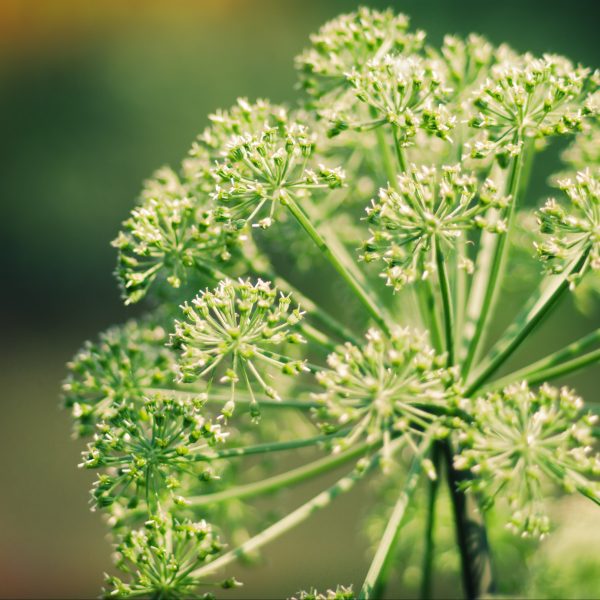Dong Quai (Angelica sinensis) is one of the most powerful female fertility tonic herbs. Used since at least the first century, Dong Quai tonifies and strengthens the uterus by regulating hormonal control, improving uterine tone, and improving the timing of the menstrual cycle. In Asia, Dong Quai is to women’s health as ginseng is to men’s health.
In traditional Chinese medicine, Dong Quai is referred to as a blood tonic as it has a general effect on circulation. This could be helpful for women experiencing pale menstrual flow, absent periods, and weakness after periods (in TCM, this is called blood deficient). It has also been shown to improve red blood cell counts. Dong Quai is traditionally used for situations of stagnation (PCOS, endometriosis, ovarian cysts, and uterine fibroids) as it increases the blood flow to the reproductive system, reducing congestion and pain.
Australian Medical Herbalist Richard Whelan shares of “A study in the prominent Japanese medical journal Yakuga Zassh showed that Dong Quai was 1.7 times stronger than aspirin at relieving pain. Many clinical studies have been performed in Taiwan, China and Japan using Dong Quai for conditions involving chronic pain with high rates of success.” Chronic pain that includes dysmenorrhea.
Dong Quai may be helpful for:
- Menstrual irregularities
- Delayed or absent menstruation
- Short periods with cramping
- Strengthening a “weakened uterus”
- Cramping and PMS during your period
- Women who have stopped taking birth control pills and need to encourage a regular cycle
- Light or slow starting menstruation
- Stagnant conditions
How Dong Quai Works
Dong Quai works by promoting blood flow to the pelvis where it will stimulate an absent or scanty period. It also nourishes the blood (it is in nearly all Chinese herbal blood-building formulas) and helps iron deficiency and anemia. Dong Quai is really effective in helping women who are not menstruating to invite their menstruation back. The increased circulation also helps to strengthen and balance the uterus. In rat studies, it has been shown to help build the uterus lining.
Dong Quai also has a relaxing effect on both the uterus and the nervous system. This can be helpful in situations such as PMS and cramping during your period. Its relaxing effects are just as powerful as other well-known herbs used for relaxation such as – lavender, chamomile, or valerian root.
How to Use Dong Quai
We find that Dong Quai is best taken as a liquid extract (tincture). The daily suggested use of Dong Quai is 30 drops, 2 times a day in a little water.
Safety & Side Effects
While Dong Quai is considered safe for most people, there are some instances this herb should not be used.
- Not to be used during pregnancy due to its stimulating effect on the uterus.
- Do not use during menstruation as it may increase the menstrual flow. Those with scanty flow may find it beneficial all month long.
- Dong Quai should not be used by those with diarrhea, hemorrhagic diseases, or excessive menstrual flow.
- If you are using any anti-coagulant or blood thinning medication such as warfarin or aspirin, consult your health care professional prior to using this product.
- Discontinue use 2 weeks prior to undergoing surgical procedures.
Safety Ratings
The Botanical Safety Handbook classifies Dong Quai as a class 2b: Not to be used during pregnancy unless otherwise directed by an expert qualified in the use of the described substance.
- Trickey, Ruth. (2003). Women, Hormones and The Menstrual Cycle – herbal and medical solutions from adolescence to menopause. Crows nest, NSW: Allen & Unwin.
- Whelan, R. (n.d.). DONG QUAI. Retrieved from https://rjwhelan.co.nz/herbs%20A-Z/dongquai.html
- Hirata, J. D., Swiersz, L. M., Zell, B., Small, R., & Ettinger, B. (1998). Does Dong Quai Have Estrogenic Effects in Postmenopausal Women? A Double-Blind, Placebo-Controlled Trial. Obstetrical & Gynecological Survey, 53(5), 295-296. doi:10.1097/00006254-199805000-00021 Retrieved from: https://www.fertstert.org/article/S0015-0282(97)00397-X/pdf
- Huang, L., Li, B., Liang, Y., Guo, F., & Wang, Y. (2004). Application of combined approach to analyze the constituents of essential oil from Dong quai. Analytical and Bioanalytical Chemistry, 378(2), 510-517. doi:10.1007/s00216-003-2309-z Retrieved from: http://europepmc.org/abstract/med/14658022
- Gerner, Zoe & McGuffin, Michael. (2013) Botanical Safety Handbook. Second Edition. Taylor & Francis Group





